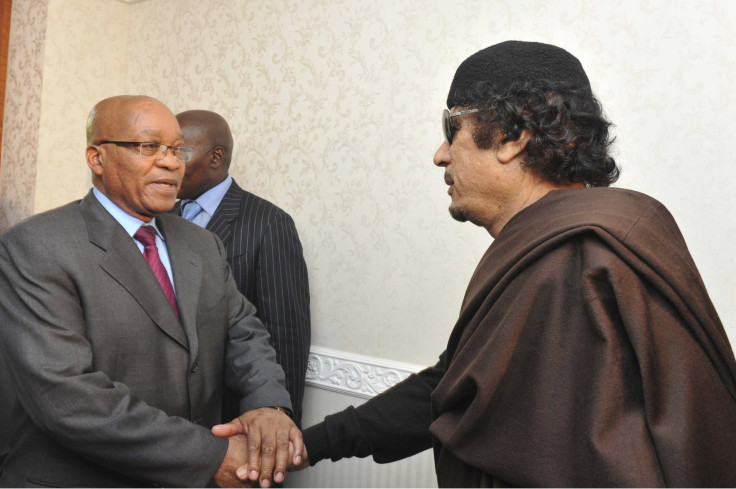The $1 Billion Question: Did Libya’s Gaddafi Stash Fortune In South Africa?

Muammar Gaddafi, the late dictator of Libya, and his family may have stashed away at least $1 billion in assets -- including gold, diamonds and cash -- in South Africa, according to media reports. Responding to requests from the new government in Tripoli, which considers any assets formerly held by Gaddafi as state-owned property, South African officials are investigating the Gaddafi money trail in their country.
"There was a group that approached [the] Treasury claiming to represent the Libyan government and we are in the process of verifying their claims about assets that are in South Africa," Jabulani Sikhakhane, a spokesman for South Africa’s Finance Minister Pravin Gordhan told the Sunday Times newspaper. "The process of verifying the group's claim is under way.” Sikhakhane warned that it may take a considerable amount of time to locate and repatriate all the Libyan assets in the nation.
The assets are reportedly held by four banks and two security firms in South Africa, Libyan investigators claim. In letters sent to South African government ministers, Libyan officials said the assets may have been “illegally possessed, obtained, looted, deposited or hidden” in South Africa.
Gaddafi, who ruled Libya for more than four decades under a brutal regime, was captured and murdered by rebels in the town of Sirte in October 2011. He and his family reportedly have an estimated $80 billion in assets parked in banks and other institutions around the world.
Separately, a man named Bashir Saleh, said to be Gaddafi’s “banker,” has been seen traveling freely through South Africa, even attending the centenary celebrations of the ruling African National Congress (ANC) party in January 2012 and attending the BRICS economic summit in March of this year, according to the Sunday Times.
Saleh is likely linked to the $1 billion in assets owned by Gaddafi in the country, the paper added. As recently as three weeks ago, Saleh was spotted at the five-star Michelangelo hotel in Johannesburg. The “banker” is believed to be traveling between South African, Swaziland and Niger.
The Sunday Times also noted that Saleh’s whereabouts and the possible existence of Gaddafi assets in South African may have come from testimony provided by Abdullah al-Senussi, Libya's former intelligence chief, who is currently under arrest for crimes against humanity.
The Guardian newspaper reported that Libyan investigators are demanding that the Pretoria government arrest Saleh, who is currently on Interpol’s most wanted list. Opposition lawmakers in South Africa are also calling for Saleh’s immediate detention.
"What is he [Saleh] doing strolling in and out of our country when he's on the most-wanted list? If we had any crime intelligence at all, they would know who this was and arrest him on the spot,” declared Dianne Kohler Barnard, shadow police minister and member of the opposition Democratic Alliance party. "There's a possibility he's being protected by members of the ANC, maybe on the instructions of 'number one' [president Jacob Zuma]. How else could someone on the Interpol list get such protection?"
Barnard added: "Urgent action must now be taken to rectify this. Bashir Saleh must be immediately arrested and a full investigation conducted so that the world knows that South Africa will not allow itself to become a safe haven for international criminals."
Barnard’s allegations of close ties between the ANC and the Gaddafi regime have long been embarrassing to South Africa’s post-apartheid governments. However, Gaddafi actually had turbulent relations with the ANC.
Nelson Mandela, the South African icon, once praised Gaddafi for supporting the anti-apartheid movement in the country and once even said: "Those who feel irritated by our friendship with… Gaddafi can go jump in the pool." However, Thabo Mbeki, who succeeded Mandela as South African president, distanced the ANC from Gaddafi, suggesting there was no close connections.
"The incontrovertible fact is that during this whole period, Libya did not give the ANC even one cent, did not train even one of our military combatants and did not supply us with even one bullet," he once said. "This is because Gaddafi's Libya made the determination that the ANC was little more than an instrument of Zionist Israel because we had among our leaders such outstanding patriots as the late [Jewish South African Communist leader] Joe Slovo."
Mbeki, who took over in 1999, reportedly disdained Gaddafi and called him an “idiot” for wanting Pretoria to break of relations with the U.S. However, the current South African leader, Jacob Zuma, had ties with the former Libyan strongman. He criticized the NATO campaign to bomb Libya during the civil war and he even condemned those who murdered Gaddafi.
Shortly after Gaddafi’s death, Zuma told the South African media: "Given there was a warrant of arrest against Gaddafi, those who found him should have arrested him and handed him to the [International Criminal Court]. We expected him to be captured, given that everybody knew there was a warrant of arrest issued against him."
Zuma added: "There is a trend across the world where former leaders accused of injustice are not given an opportunity to stand trial in a court of justice. That is surprising. I think even those who accused him [Gaddafi] would have wanted to see him become answerable.”
© Copyright IBTimes 2024. All rights reserved.











